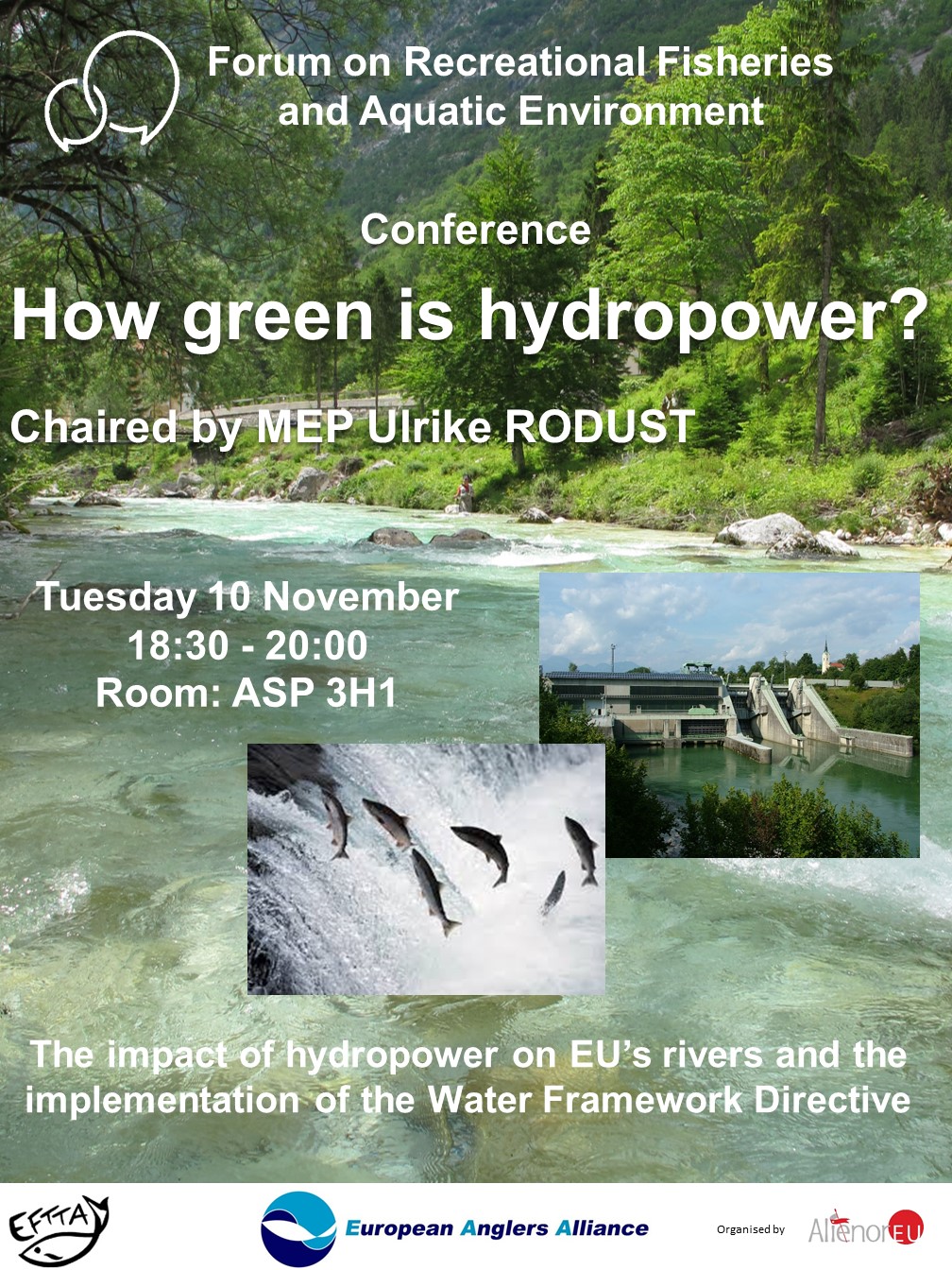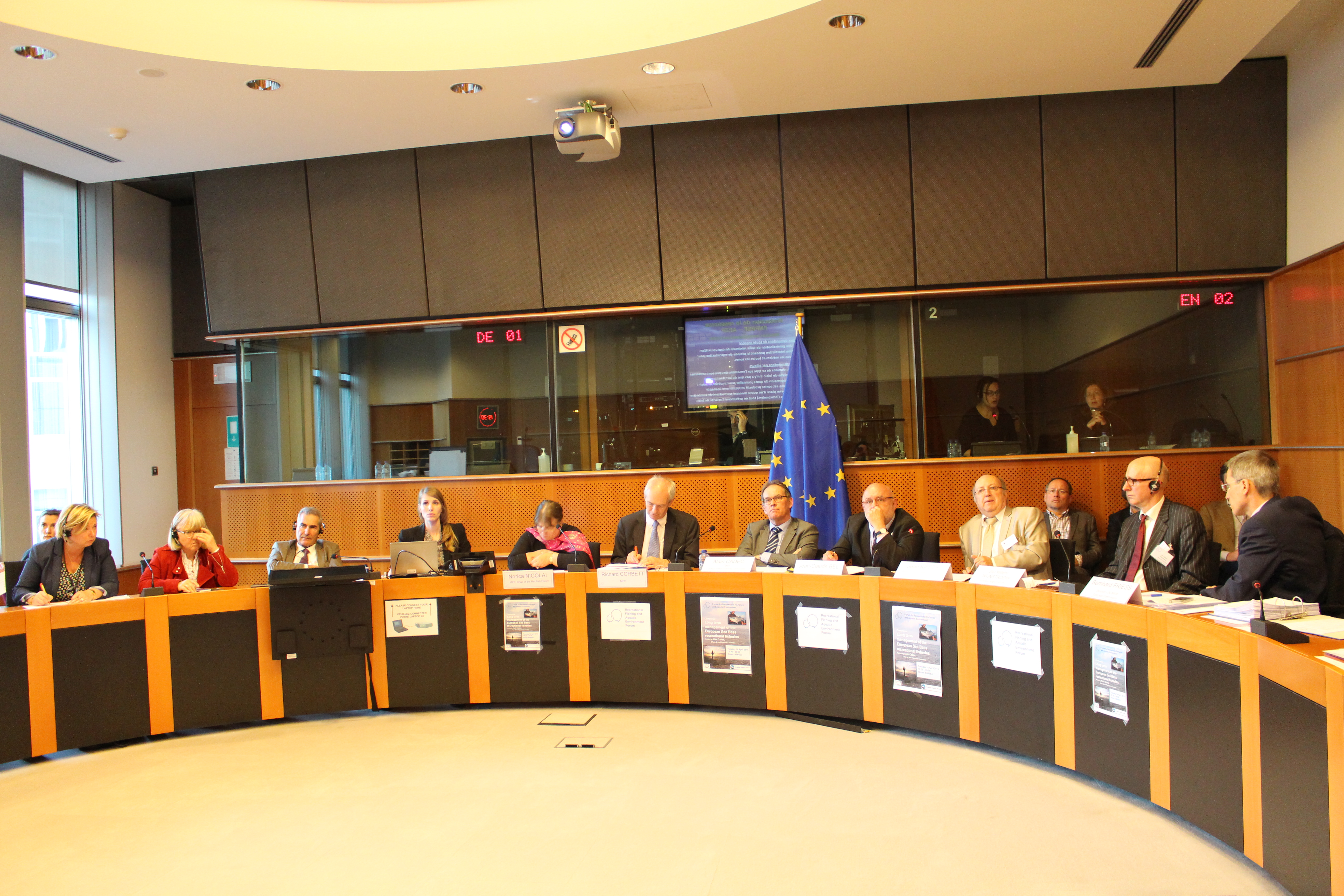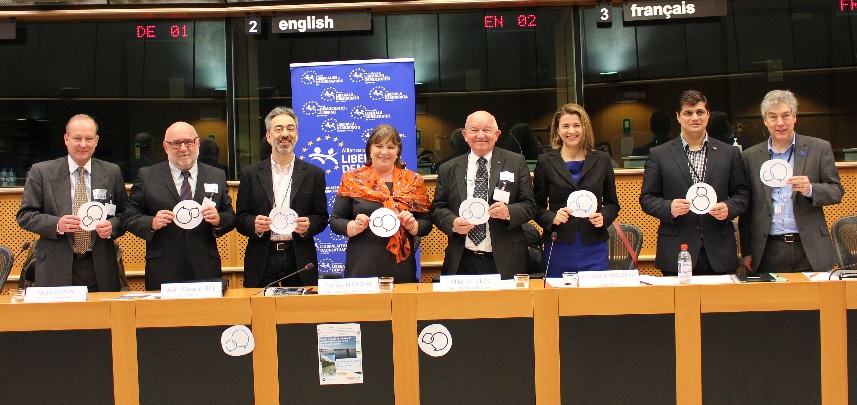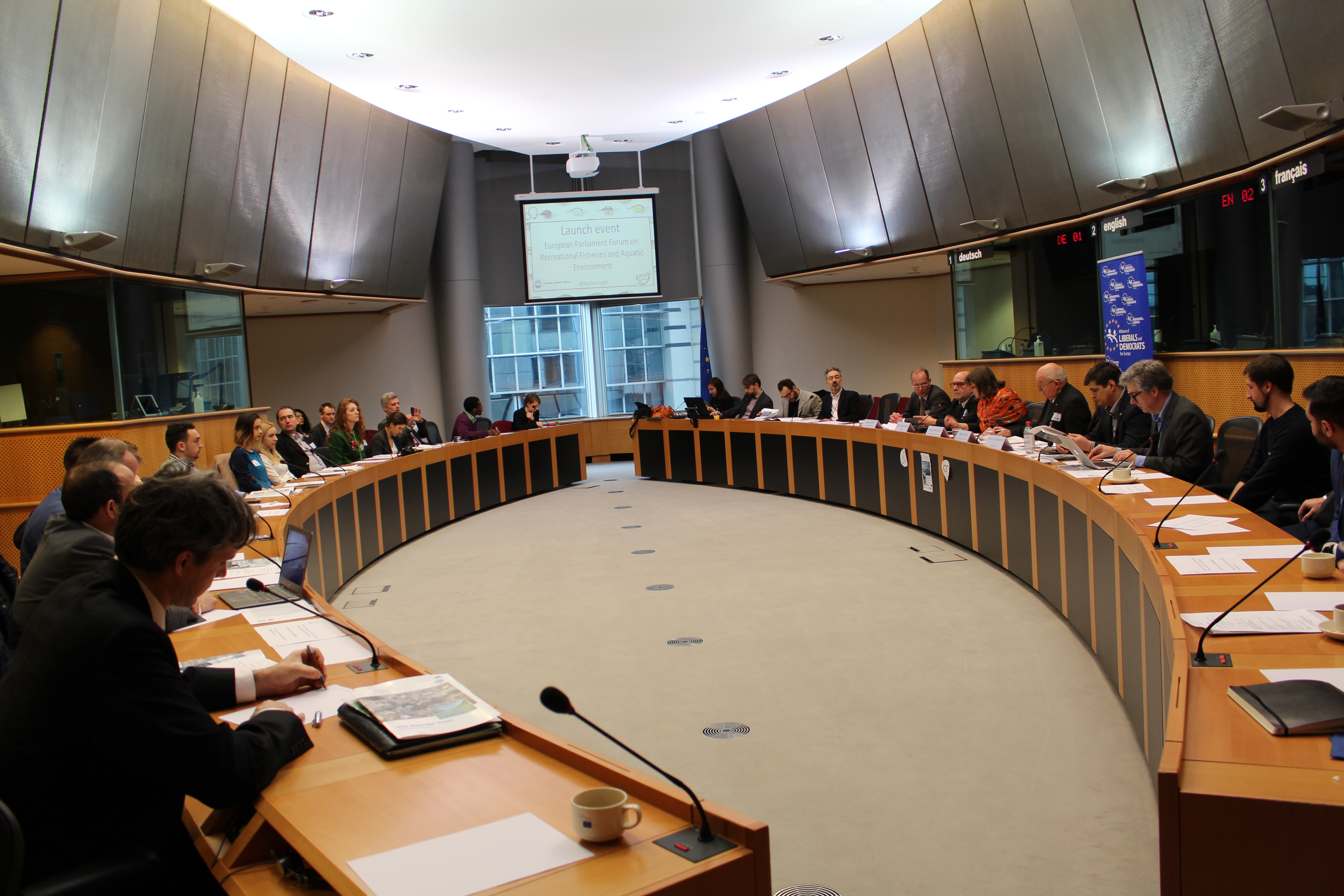 EP RecFishing Forum News
EP RecFishing Forum News
Conference: The Danube under threat
The Danube salmon - a barometer of the river basin's poor health
19 April 2016
European Parliament
MEP Norica Nicolai, the European Anglers Alliance (EAA) and the European Fishing Tackle Trade Association (EFTTA) are glad to invite you to the conference "The Danube under threat. The Danube salmon - a barometer of the river basin's poor health" organised by the European Parliament Forum on Recreational Fisheries and Aquatic Environment.
The event will take place on the 19th of April 2016 in the European Parliament from 12:30 to 15:00 - lunch will be provided
You can download the draft programme here. If you need a badge to enter in the European Parliament, please register before the 11th of April by clicking here.
The Danube river is the longest river in Europe, linking the Alps to the Black Sea. It hosts some incredibly rich and fragile ecosystems that are currently facing many challenges (pollution, waste, floods, dams…). The Danube river is also an example of how the regional cooperation and conservation policies are the only solution to preserve Europe’s biodiversity.
The illustration of the Danube situation will be done through a focus on one of the most emblematic species of this river: the Danube salmon (hucho hucho) – an IUCN red list species.
Hydropower energy is not a perfect solution for nature
An event organised in the European
Parliament shows how hydroelectricity is wrongly perceived as a green energy
despite its important impacts on the environment.
Organised by the Recreational Fisheries and Aquatic Environment Forum in the European Parliament on the 10th of November, the conference entitled "How green is hydropower?" addressed a widely unknown aspect of "renewables" in a time of crucial decisions for the future climate and energy policies.
“To reach the
CO2-emission and renewable goals we will depend on the contribution of
hydropower but we should not play down or ignore the unwanted effects on the
aquatic environment or even on our climate.“
Ulrike Rodust,
Member of the European Parliament
Different speakers
from the scientific community and environmental NGOs such as WWF highlighted
how the presence of dams affects water quality and makes fish migration almost
impossible, upholding the impoverishment of European rivers. Some engineering
works are built to mitigate these effects but water level fluctuations still
cause important damages on fish populations and biodiversity balance
(vegetation, river banks filling, stream banks alterations, invertebrates and
young fish mortality…). It is also proved that dams contribute to release
methane - a greenhouse gas - in the atmosphere.
The European anglers,
who organised this event, consider that this important information should be
taken into consideration when assessing the role that hydropower can play to
reach the EU energy and climate targets or when deciding on new hydropower
projects funded with public money.
The reviews of the
implementation of the European Union’s environmental legislation show that the
state of the rivers in Europe is alarming, with failing fish populations being
one of the most common reasons for failure in the Water Framework Directive and
that hydroelectricity has much to do with this. When all EU’s biggest rivers
are already dammed, the development of hydropower now mainly concerns small
scale plants in little rivers endangering fragile ecosystems while producing
only a small amount of energy. For example, around 7300 of the 8000 hydropower
plants in Germany are small hydropower plants producing 8-10% of the total generated
electricity from hydropower and covering only 0.05% of the total electricity
consumption in Germany. What is more, many projects to build new plants are
under way, included inside Natura 2000 areas, where the most valuable and
threatened species and habitats in the EU can be found. As it was explained
during the event, in Romania 99% of small hydropower projects do not require an
environmental impact assessment.
The next Recreational
Fisheries Forum’s event will focus on the Danube River and its endangered
ecosystem including the iconic Huchen (Danube salmon).
Download our press
release here
Pictures and presentations are
available here
Download the report of the event here
Save the date

The ‘Forum on
Recreational Fisheries and Aquatic Environment’ will organise an event
onhydropowerand in particular on the effects of small dams
on the EU river's ecosystems.
The event will take place in theEuropean Parliament on
the10th of November from 18:30 to 20:00 in room ASP 3H1and
will be chaired byMEP Ulrike Rodust.
You can download the
programme of the conference here.
For registrations,
please send an email to cecile@eaa-europe.eu
Anglers support strong but fair measures to protect the European sea bass

On the 14th of April 2015, the
European Parliament Forum for Recreational Fisheries and Aquatic Environment, created on the initiative of the European Anglers Alliance (EAA) and the European Fishing Tackle Trade Association (EFTTA),
welcomed more than 40 participants to an event entitled
“Long term management of the European Sea Bass recreational fisheries”. The sustainable management of sea bass is of uptmost importance for EU recreational anglers as well as for the industry relying on their activities.
After the welcoming remarks made by MEP Norica Nicolai, President of the RecFishing Forum, the conference was chaired by MEP Alain Cadec, Chair of the EP’s Committee on Fisheries, who presented ICES’ scientific overview and recommendations on the dramatic state of the sea bass stock in the North East Atlantic. Alain Cadec recalled that good management of the sea bass fisheries should be based on a dialogue between recreational fishermen and professionals.
Mr. Jean Claude Bel, CEO of the European Fishing Tackle Trade Association (EFTTA), stressed that, in some countries, the employment and the economic output generated by the 25 % of sea bass retained by anglers is up to 75% higher than for commercial fisheries. “Recreational angling should be treated fairly and its socio-economic output must be acknowledged.”
Mr. Jean Kiffer, President of the FNPPSF, a French maritime anglers’ organisation member of the European Anglers Alliance (EAA), presented the case of France in which the dramatic situation includes a lot of poaching. He asked for control and enforcement measures to be strengthened. He declared that sea bass fisheries should be forbidden during the breeding season in all zones and for all fishermen.
Mr. Jan Willem Wijnstroom from the EAA explained that anglers have been asking for measures since the 2000’s. Now that sea bass stocks are in deep trouble, urgent actions are needed. EAA advises that a higher Minimum Landing Size (MSL) for all, commercial and recreational, bass should be adopted and that fishing mortality is promptly reduced.
Bernard Friess, Director at DG MARE, European Commission, said that the European Commission took the exceptional step of introducing emergency measures in January this year to face this alarming situation. The Commission will now propose to the EU Member States new catch limits for all commercial fisheries and an increase of the MLS to 42 cm. It is also preparing a proposal for a Long Term Management Plan for the North and the South Atlantic sea bass fisheries. The plan will have to be adopted by the EP and the Council. These announcements were warmly welcomed by the anglers’ representatives.
After a lively debate between the audience and the 10 MEPs present, the event was concluded by MEP Richard Corbett, who called for a "safety first approach" and fair management of sea bass and for measures in which commercials should play the main part for the preservation of this iconic species. “Anglers will accept the limitations, so long as they are not the only ones making sacrifices”.
Download our press release here.
Pictures and presentations are available here.
Conference: Long term management plan of the European Sea Bass recreational fisheries
14 April 2015
European Parliament, Brussels
MEP Alain Cadec, the European Anglers Alliance (EAA) and the
European Fishing Tackle Trade Association (EFTTA) are glad to invite you
to the conference “Long term management of the European Sea Bass
recreational fisheries” organised by the European Parliament Forum
on Recreational Fisheries and Aquatic Environment.
Where: European Parliament, ASP5E3
When: 14th April 2015 from 18:30 to
20:00
You can download the programme here.
The sustainable management of sea bass is of outmost
importance for the EU recreational fishermen as well as for the economic sector
relying on their activities. This event will gather the sea bass
specialists from the anglers associations, the representatives from the
sportfishing equipment sector and representatives from the European Commission,
who will be in charge of proposing new measures to guarantee the survival of
this iconic species.

RecFishing Forum launched in the European Parliament to strengthen the voice of 25 million EU anglers in Brussels
On the 25th of March, the Forum on Recreational Fisheries and Aquatic Environment was launched in the European Parliament. The launch event, entitled “Why do we need to talk about Recreational Fisheries in the European Parliament? Economics, Environment and Rural Development”, was the first occasion for the several Members of the European Parliament (MEPs) present to exchange opinions with the representatives of the European Anglers Alliance (EAA) and the European Fishing Tackle Trade Association (EFTTA).
The event was chaired by the President of the Forum, MEP Norica Nicolai (Romania, ALDE). After the welcoming remarks, she gave the floor to Mike Heylin OBE, Board Member of EAA and Jean-Claude Bel, CEO of EFTTA who expressed the main purposes of the establishment of this informal Forum. In particular, Mr. Heylin underlined: “25 million people regularly fish across the EU, the biggest EU constituency. They must be better taken into consideration by their EU representatives”.

Mr. Bel showed some important figures about the economic and social importance of angling (fishing with hooks and lines) in the EU. He highlighted that 1 kg of fish caught by a recreational fisherman brings 200-300 EUR to the economy and that the economic ripple effect sees more than 39 billion EUR annually and 800,000 jobs. Mr. Bel then explained how the development of these low-environmental impact activities can be an important tool for rural development: “Angling tourism brought 280 million EUR into the Irish economy in 2012, more than golf”.
In her presentation, Anna Gueorguieva, senior economist at the World Bank, presented the integrated sustainable development strategy currently being designed with support by the World Bank in the Danube delta region, in which recreational fisheries are expected to be a sustainable driving force to enhance fisheries management and reinforce tourism and rural development.
Mark Owen, Head of Freshwater Affairs in EAA’s member organisation Angling Trust, gave a presentation on the role of anglers as “guardians and protectors of the aquatic environment”. He also pointed out the social role of fishing organisations through projects devolved for instance to youth and people with physical, social or mental handicaps.
MEP Norica Nicolai concluded the lively debate with the audience by insisting on the economic potential of recreational fisheries: “Our passion can also be a key for job creation and economic development”, she declared.
The next event of the Forum entitled “The European sea bass recreational fisheries and its long term management” is scheduled on the 14th April. It will be chaired by MEP Alain Cadec, President of the European Parliament Committee on Fisheries.
Download our press release here .


Credit for the pictures: RecFishing Forum
25 MARCH 2015: LAUNCH EVENT OF THE RECREATIONAL FISHERIES DISCUSSION FORUM
On the 25th of March at lunchtime, you are invited to the launch event of the Recreational Fisheries and Aquatic Environment Forum, chaired by MEP Norica Nicolai.
This event will be Entitled "Why do we need to talk about recreational fisheries in the European Parliament? Economics, Environment, Rural Development " .
It will be a great opportunity for MEPs to meet several at at European anglers' associations and to learn more about how angling bring benefits to the economy, the environment and rural development.
The Intergroup on Aquatic Environment and Recreational Fisheries - Campaign Update
(Oct. 2014)
The campaign for the creation of the Intergroup continued in September and the Secretariat Organized an important number of bilateral meetings with MEPs and Their Assistants in order to inform them about our project and secure the vote of at least three political groups before the 26th of November, All All All All which is the date the political groups Shall vote On Their preferred Inter Groups among more than one hundred candidates.

Pierangelo Zanetta, EFTTA President
On Wednesday 16 July, the European Anglers Alliance (EAA) and the European Fishing Tackle Trade Association (EFTTA) Organized a reception, chaired by MEP Nils Torvalds (Finland, ALDE) in the European Parliament in Strasburg. The reception was Organized in order to meetwith the Members of the European Parliament (MEPs) and Discuss about the establishment of an Intergroup on Aquatic Environment and Recreational Fisheries.


Nils Torvalds, Member of the European Parliament and Fred Exposed, EAA President
We had the honor to welcome an important number of MEPs. All of them overexpressed Their interest in our project, the willingness to get involved '' '' Personally and to help the Secretariat in organizing events.
The objectives of the creation of this Intergroup are:
- Improving the contact and communication between the MEPs and Their 25 million angling constituents;
- serving as a forum for discussion on fish stocks, recreational fishing, environment, rural development, fishing tourism;
- MEPs giving access to EAA and EFTTA in-house experts and broad network of scientists.
The campaign for the creation of the Intergroup continued in September and the Secretariat Organized an important number of bilateral meetings with MEPs and Their Assistants in order to inform them about our project and secure the vote of at least three political groups before the 26th of November, All All All All which is the date the political groups Shall vote On Their preferred Inter Groups among more than one hundred candidates.
Contact:
RecFishing Intergroup Secretariat
Cécile Fouquet
+32 (0) 2 791 76 10
cecile@eaa-europe.eu
Examples of the angling communities' commitment to the environment:
Story # 1 England's Angling Trust Initiative (oct. 2014)

The Angling Trust is the main angling organization in England, with 17,000 individual members and 1,800 clubs and associations representing 340,000 anglers. Besides notes notes notes its promoting angling, the Angling Trust carries out a wide range of Initiatives to Protect the environment and to fight against pollution Commercial over-fishing at sea and poaching. The knowledge and expertise That the anglers have built by spending a lot of time on the field Represents an important resource for the management or thesis activities.
The Angling Trust riding schools different environmental campaigns targeting the effects of agriculture pollution, hydroelectric powerplants, poaching and invasive alien species on the freshwaters' ecosystems. The naval campaigns group topics such as the minimum landing sizes, marine conservation areas and the need for sustainable management plans to manage fish stocks.

Environment Agency and Angling Trust staff with the first intake of Volunteer Bailiffs, May 2012
Many of the Angling Trust's activities are carried out by or with the help of volunteers. This is the case of the "Voluntary Bailiff Service" , a project put in place in 2012 in order to support the work of the officers of the Environment Agency Fishery Enforcement. The Angling Trust's volunteers follow a training Organized in three phases and develop an in-depth knowledge about angling law and the Police and Criminal Evidence Act, the Criminal Justice System and conflict resolution. At the time being, the service is in pilot phase notes in South East England. Meetings are in progress with a view to extended extended extended extended extending coverage. So far, the pilot project HAS worked well, with Volunteer Bailiffs Regularly patrolling and reporting incidents and information.
-> More information on the Angling Trust campaigns .
Marine Affairs - Across and Beyond Remits
(Oct. 2014)
Over the years, the EU HAS put in place a complex web of intertwined policies and Legislative Instruments of Importance for naval affairs. The best known ones May be the Marine Strategy Framework Directive (MSFD), the Water Framework Directive (WFD), the Habitats and Birds Directives (HWD) and the Common Fisheries Policy (CFP). Earlier this year a Directive on Maritime Spatial Planning HAS BEEN adopted. 'Coherence' thesis between all policies is not fully achieved as yet but EU 'working on it' .
Marine issues are Dealt with by a number of committees at the European Parliament with no single committee having a remit to deal with it all alone. Compartmentalisation and 'silo thinking' could lead to less coherence, shouldering-which be avoided, but how? Ms. . . Lowri Evans, the Director General of the European Commission's Directorate-General for Maritime Affairs and Fisheries (DG MARE) Introduced the work of the European Commission to the new Members of the Parliament's Committee on Fisheries, the 22nd of July. Check the video here , go to 17:17:00
In her introduction she Reminded That the Members DG MARE deals with the Common Fisheries Policy but also with the EU maritime policy. The Parliament's Committee on Fisheries does not have the wider remit outside fisheries but Ms. Evans overexpressed re sincere Hope that all Committee Members will take an interest in maritime issues also outside Their remit as "sea management goes way beyond fish!"
The Integrated Maritime Policy
The Integrated Maritime Policy (IMP) (2007) Provides a frame for legislation and policies to conserve and protect the marine environment as well as to Enhance the sustainable development of the European maritime economy by facilitating the cooperation of all maritime players across sectors and borders. The IMP seeks to providence a more coherent approach to maritime issues, with Increased coordination between different policy areas so as to "change the way we make policy and take decisions '...' compartmentalised policy development and decision-making are no longer adequate. '
Mr. Karmenu Vella, the future new Commissioner, will not only be in charge of the Maritime Affairs and Fisheries only but also of the Environment Policy. This merge or portfolios is Meant "to reflect the twin logic of 'Blue' and 'Green' Growth 'accor ding to the new Commission President Jean-Claude Juncker. "Environment and maritime conservation policies can play a key and shouldering role in creating jobs, preserving resources, stimulating growth and Encouraging investment. Protecting the environment and Maintaining our competitive ness have to go hand-in-hand, "he added.
It can be argued That the Commission is now better than Organised internally is the Parliament to deal with marine affairs, -including protection of the marine environment. But critics fear That the environment will drowsy under the Commission's new constellation, as growth concerns prevail over May the protection of the environment. HOWEVER, the Commission can not decide all alone. The Parliament and the Council have the power to influence the Commission's Legislative Proposals. Can we count on the Parliament and the Council to be more "green" than the Commission? Time will tell.